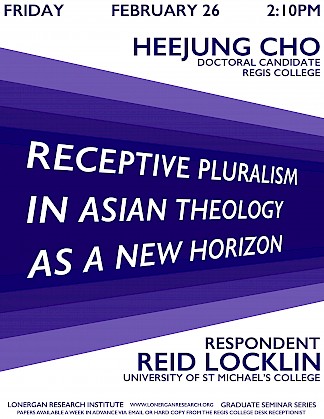Regis doctoral candidate Heejung Adele Cho presents “Receptive Pluralism in Asian Theology as a New Horizon.” A response will be offered by Reid Locklin, University of St Michael’s College. Free and open to the public, reception to follow. Seminar papers available a week in advance from the Regis front desk or by emailing the LRI.
Receptive Pluralism in Asian Theology as a New Horizon
Asia and the Middle East are the birthplaces of the world’s major religions such as Judaism, Christianity, Islam, Hinduism, Buddhism, Confucianism, Taoism, as well as various primal religions. In the presence of many religions, people of different faiths have been forced to live side by side for thousands of years. Religious pluralism is the term given to this reality of people living with both ethnic, religious, and cultural differences. In their attempt to understand these differences, the Asian bishops have entered into interreligious dialogue and have adopted a stance of receptive pluralism. According to them, receptive pluralism is a pluralism of different expressions of reception of revelation that occurs due to the pluralistic nature of the human context in which divine revelation is received and understood. Receptive pluralism does not lead to relativism because harmony of expression within pluralism is possible. Additional expressions are beneficial for a fuller understanding of reality.
This paper will examine the notion of receptive pluralism as a new horizon according to the functional specialization of Bernard Lonergan. The functional specialization is a methodical framework that provides different stages of theology which are: research, interpretation, history, dialectic, foundations, doctrines, systematics, and communications. I will especially focus on the foundations within which objectification of conversion and emergence of a new horizon takes place. The emergence of the notion of receptive pluralism suggests a formation of a new horizon in understanding the situation of religious pluralism in Asia. The notion of receptive pluralism emerged by the communal conversion of the Asian bishops as they sought to understand the various actual relationships between culture and religion in an Asian context under various conditions. A careful study of receptive pluralism also shows that the foundations have implications on the distinction between doctrines and systematics of the functional specialization.

